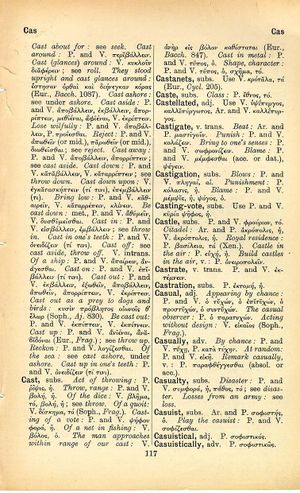castigate: Difference between revisions
Νόμος γονεῦσιν ἰσοθέους τιμὰς νέμειν → Iubet parentes lex coli iuxta deos → Die Eltern gleich den Göttern ehren ist Gesetz
(3_3) |
m (Text replacement - "}}]]" to "}}]]") |
||
| Line 1: | Line 1: | ||
{{Woodhouse1 | {{Woodhouse1 | ||
|Text=[[File:woodhouse_117.jpg|thumb | |Text=[[File:woodhouse_117.jpg|thumb | ||
|link={{filepath:woodhouse_117.jpg | |link={{filepath:woodhouse_117.jpg}}]]'''v. trans.''' | ||
<b class="b2">Beat</b>: Ar. and P. μαστιγοῦν. | <b class="b2">Beat</b>: Ar. and P. μαστιγοῦν. | ||
Revision as of 10:08, 15 August 2017
English > Greek (Woodhouse)
v. trans.
Beat: Ar. and P. μαστιγοῦν.
Punish: P. and V. κολάζειν.
Bring to one's senses: P. and V. σωφρονίζειν.
Blame: P. and V. μέμφεσθαι (acc. or dat.), ψέγειν.
Latin > English (Lewis & Short)
castīgātē: adv., v. castigo.
Latin > French (Gaffiot 2016)
castīgātē (castigatus),
1 avec réserve, retenue : Sen. Rhet. Contr. 6, 8
2 d’une manière concise : Macr. Scip. 1, 6 || -tius Amm. 22, 3, 12, avec plus de réserve.
Latin > German (Georges)
castīgātē, Adv. m. Compar. (castigatus, eingeschränkt), a) in Worten knapp gehalten, kurz, haec de monade castigatius quam se copia suggerebat, Macr. somm. Scip. 1, 6, 10. – b) eingeschränkt, eingezogen, castigate vivere, Sen. exc. contr. 6, 8. § 5: castigatius vivere, Amm. 22, 3, 12: castigatius (behutsamer) agere, Amm. 31, 14, 3.

